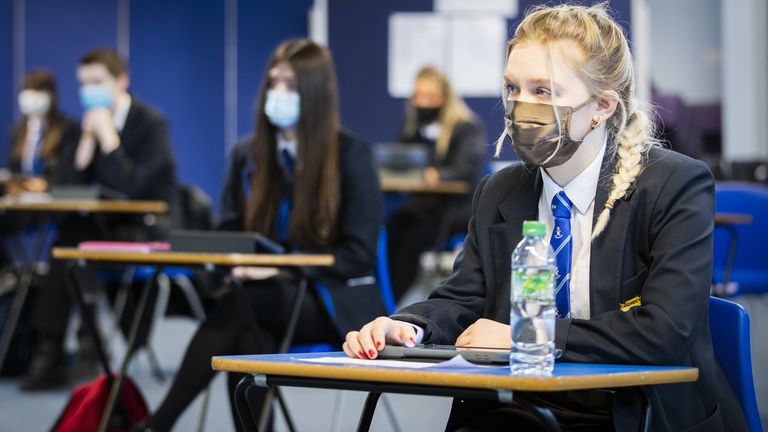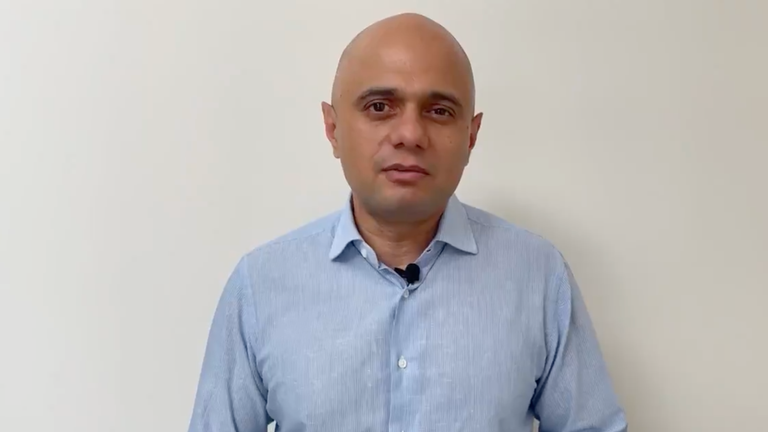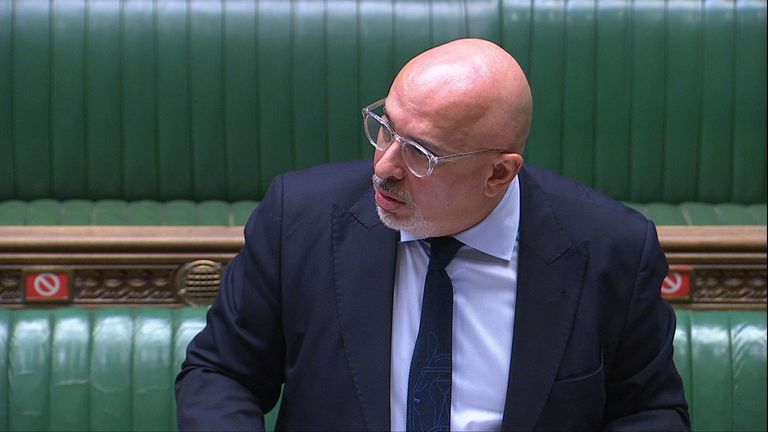Clinically vulnerable children and those living with at-risk adults will be offered a COVID-19 vaccine – but most teenagers will not, Nadhim Zahawi has announced.
The vaccines minister told MPs that the Joint Committee on Vaccination and Immunisation (JVCI) has recommended that children “at an increased risk of serious COVID-19 disease” should be offered the coronavirus jab, and that the government will take on board this advice.
It means children aged between 12 and 15-years-old with severe neurodisabilities, Down’s syndrome, immunosuppression and multiple or severe learning disabilities will be offered the Pfizer-BioNTech vaccine.
Those children in the same age range who live with an immunosuppressed person will also be offered the vaccine, Mr Zahawi said.
But the government will not be offering all healthy teenagers a coronavirus jab at present as the JVCI is not advising it.
The JVCI said it had made this decision as “evidence shows that COVID-19 rarely causes severe disease in children without underlying health conditions” and that “the minimal health benefits of offering universal COVID-19 vaccination to children do not outweigh the potential risks”.
However, healthy children who are less than three months away from their 18th birthday will be allowed to receive the vaccine “to ensure good uptake in newly turned 18-year-olds”.
Newly appointed Health Secretary Sajid Javid said the JVCI will “consider whether to recommend vaccinating under-18s without underlying health conditions at a future date”.
The JVCI had been looking at whether children should be vaccinated and recently delivered their advice on the topic to the government for ministers to consider.
The Medicines and Healthcare products Regulatory Agency last month approved the Pfizer/BioNTech vaccine for 12 to 15-year-olds.
The jab was approved for use in the UK for 16 and 17-year-olds in December.
The JCVI’s current advice is that those aged 16-18 should be offered vaccination if they are in a priority Phase 1 group or they are the household contacts of someone who is immunosuppressed.
In a statement, Mr Javid added that he has asked the NHS to prepare to vaccinate the eligible vulnerable children “as soon as possible”.
“Today’s advice from the independent Joint Committee on Vaccination and Immunisation (JCVI) means more vulnerable young people at greatest risk from this virus can now benefit from COVID-19 vaccines,” he said.
“I have accepted their expert recommendations and I have asked the NHS to prepare to vaccinate those eligible as soon as possible.
“Young people aged 12 to 15 with severe neuro-disabilities, Down’s Syndrome, immunosuppression and multiple or severe learning disabilities, as well as people who are household contacts of individuals who are immunosuppressed, will be eligible for vaccination soon.
“Our independent medicines regulator, the Medicines and Healthcare products Regulatory Agency, has approved the Pfizer/BioNTech vaccine for people aged 12 and over as it meets their robust standards of safety, effectiveness and quality.
“Today’s advice does not recommend vaccinating under-18s without underlying health conditions at this point in time. But the JCVI will continue to review new data, and consider whether to recommend vaccinating under-18s without underlying health conditions at a future date.
“COVID-19 vaccines have saved almost 37,000 lives and prevented around 11.7 million infections in England alone. They are building a wall of defence and are the best way to protect people from serious illness. I encourage everybody who is eligible to get their jabs as soon as they can.”
Professor Anthony Harnden, Deputy Chair of the JCVI, said the health benefits of vaccinating all children are “small”.
“The primary aim of the vaccination programme has always been to prevent hospitalisations and deaths,” he said in a statement.
“Based on the fact that previously well children, if they do get COVID-19, are likely to have a very mild form of the disease, the health benefits of vaccinating them are small.
“The benefits of reducing transmission to the wider population from children are also highly uncertain, especially as vaccine uptake is very high in older people who are at highest risk from serious COVID-19 infection.
“We will keep this advice under review as more safety and effectiveness information becomes available.”
A member of the Scientific Advisory Group for Emergencies (SAGE) told Sky News last month that the question of whether or not children should be vaccinated against COVID is a “really close call”.
Calum Semple, professor of child health and outbreak medicine at the University of Liverpool, said children were at “much less risk of severe disease”.
He said if a decision was taken to inoculate them against COVID-19, it would be to “reduce transmission in the community, rather than primarily to protect them”.




